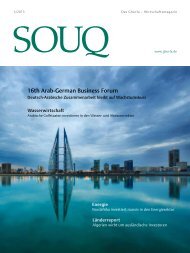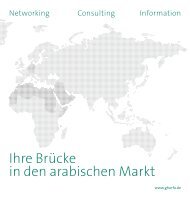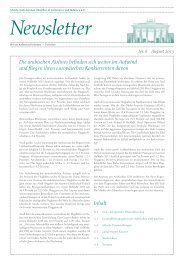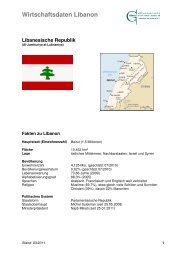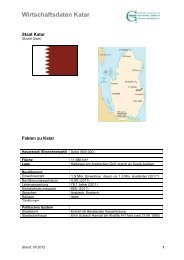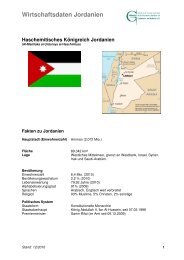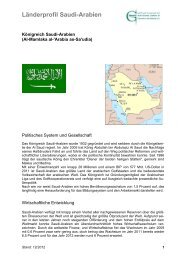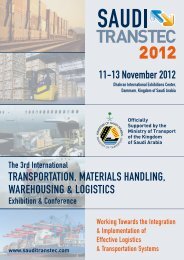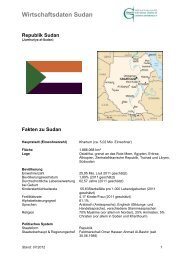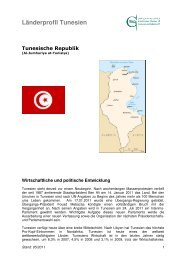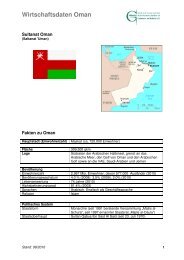The Arab-German Trade Directory - Ghorfa
The Arab-German Trade Directory - Ghorfa
The Arab-German Trade Directory - Ghorfa
Create successful ePaper yourself
Turn your PDF publications into a flip-book with our unique Google optimized e-Paper software.
Egypt<br />
Occupying the northeast corner of the African continent, Egypt is bisected<br />
by the highly fertile Nile valley, where most economic activity takes place.<br />
One of the largest economies in the <strong>Arab</strong><br />
world, Egypt is rich in resources and boasts<br />
thriving tourism and agricultural sectors.<br />
Its natural resources include oil, natural gas,<br />
iron ore, phosphates, manganese, limestone,<br />
gypsum, talc, asbestos, lead and zinc. <strong>The</strong><br />
country borders the Mediterranean Sea,<br />
between Libya and the Gaza Strip, and the<br />
Red Sea north of Sudan, and includes the<br />
Asian Sinai Peninsula.<br />
Population<br />
Egypt has the largest population in the <strong>Arab</strong><br />
world, but only the fourth-largest economy<br />
after Saudi <strong>Arab</strong>ia, the UAE and Algeria.<br />
Egypt's GDP per head at market exchange<br />
rates is expected to rise steadily throughout<br />
the forecast period (2009-2013), after<br />
falling in the period 2002-04 in dollar terms<br />
as a result of slow growth and the 45%<br />
depreciation of the Egyptian pound against<br />
the US currency between 2000 and end-<br />
2003. Real annual GDP growth is expected<br />
to average around 6%, which will almost<br />
double real GDP per head in dollar terms<br />
owing to the pound's strong appreciation.<br />
Egypt will continue to be a relatively<br />
attractive market. <strong>The</strong> size of its population<br />
makes it an important and influential<br />
market, with huge potential, and one that<br />
will continue to grow fast.<br />
<strong>The</strong> Egypt section<br />
is sponsored by<br />
This expanding middle class has substantial<br />
disposable income, and is prepared to spend<br />
it on consumer goods. Over the forecast<br />
period, there will be increasingly strong<br />
demand for items such as cars, mobile<br />
phones, flat-screen televisions and home<br />
computers.<br />
Economy<br />
Egypt’s primary economic strength stems<br />
from its diversity in comparison with the<br />
rest of the region. In 2008/2009, hydrocarbons<br />
extractions constituted 15%; manufacturing<br />
16.6%; agriculture nearly 13.7%; wholesale<br />
and retail trade 11.5%; construction and real<br />
estate 7.1%; financial and telecommunications<br />
services 6.8%; and externally oriented<br />
sources, such as the Suez Canal, 2.7% and<br />
tourism 3.5%.<br />
Reforms<br />
<strong>The</strong> Egyptian economy has been gaining<br />
thanks to the wide-ranging reforms that the<br />
country began implementing in 2004 and<br />
the subsequent awakening of domestic demand<br />
long depressed due to decades of slow<br />
growth. <strong>The</strong> reforms now have a measurable<br />
impact on the country’s economic performance<br />
and have sustained high growth for the past<br />
10 years. Changes in economic policy have<br />
been made to minimise the state's role. <strong>The</strong><br />
prime drivers of the economy are foreign<br />
direct investment (FDI), remittances, Suez<br />
Canal fees and tourism.<br />
In 2005, Egypt reduced personal and corporate<br />
tax rates, reduced energy subsidies, and<br />
privatized several enterprises. <strong>The</strong> stock<br />
market boomed, and GDP grew about 7%<br />
each year since 2006.Despite these achievements,<br />
the government has failed to raise living<br />
standards for the average Egyptian, and has<br />
had to continue providing subsidies for<br />
basic necessities.<br />
<strong>The</strong> subsidies have contributed to a sizeable<br />
budget deficit - roughly 7% of GDP in<br />
2007-08. FDI has increased significantly in<br />
the past two years, but the government will<br />
need to continue its aggressive pursuit of<br />
reforms in order to sustain the spike in investment<br />
and growth and begin to improve economic<br />
conditions for the broader population.<br />
Egypt's export sectors - particularly natural<br />
gas - have bright prospects.<br />
Oil & Gas<br />
Egypt’s crude oil and condensates reserves<br />
were at 4.19 bn barrels in mid-2008<br />
according to government figures, but rising<br />
to 4.4 bn in June 2009 following new<br />
discoveries. This would last some 15 years<br />
at current extraction rates. <strong>The</strong> mature<br />
fields in the Gulf of Suez produce about<br />
50% of the country's oil, but exploration<br />
activity is focused on frontier areas such as<br />
the Western Desert near the Libyan border,<br />
the offshore Mediterranean and Sinai.<br />
Exploration is largely undertaken by<br />
foreign companies, especially BP of the UK<br />
and Eni of Italy, in partnership with the<br />
state-owned Egyptian General Petroleum<br />
Corporation (EGPC). Eni, which produces<br />
500,000 barrels of oil equivalent per day in<br />
Egypt, of which 1.4bn cu ft/day is gas, has<br />
said that it will invest US $6bn in the oil<br />
sector until 2010, with its partners<br />
providing another US $6bn. Two-thirds of<br />
oil output is refined domestically. Because<br />
of depletion in the ageing Gulf of Suez<br />
oilfields, crude oil production has declined<br />
significantly since 1996, when it reached a<br />
high of 922,000 b/d, to around 667,000 b/d



